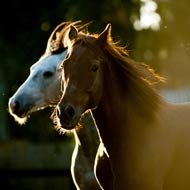New guidelines shed light on EGGD

There are distinct differences between EGGD and ‘gastric ulcers’.
Equine medicine specialists have published new guidelines on equine glandular gastric disease (EGGD), to improve the management of this condition in practice.
There are distinct differences between EGGD and ‘gastric ulcers’. A number of studies now suggest that EGGD is an inflammatory gastritis - predominantly at the gastric outflow - which has different risk factors and causes. As such, treatment for gastric ulceration may be less effective for this specific condition.
A paper published in the new equine veterinary journal, UK Vet: Equine, offers a review of published and unpublished evidence, to give vets up-to-date information on diagnosing and managing the condition.
To reduce EGGD, the authors recommend providing a minimum of two rest days from work per week, or provide regular rest periods. Horses should be turned out where possible, assuming this does not cause stress. Potential stressors, including changes to management, equine companions and human carers, should be minimised. Two litres of chaff or equivalent volume of of forage should also be fed 30 minutes before exercise.
Clinical signs are diverse, non-specific and may be mild or recurrent. Authors identified the following potential signs: changes in temperament including nervousness or aggression; changes in ride-ability such as reduced willingness to work and reluctance to go forward; unexplained weight loss, reduced appetite or altered eating patterns; colic; and cutaneous sensitivity, manifesting as flank biting or resentment of girthing, grooming, leg aids or rugging.
Based on current evidence, authors recommend the use of one of three first-line treatment options:
- Oral omeprazole at 4mg/kg PO SID with sucralfate at 12mg/kg PO BID. Feed must be withheld for a minimum of eight hours before and 30 minutes after omeprazole is administered, and sucralfate must be administered at least 30 minutes after the omeprazole.
- Misoprostol at 5μg/kg PO BID. However, misoprostol has the potential to induce abortion in humans, so this option may not be appropriate if there are concerns over human exposure.
- Long-acting omeprazole at 4mg/kg IM every five to seven days.
It is recommended that one of these three first-line treatment protocols should be selected on a case-by-case basis. All three options require the use of unlicensed medicines, so these should be used in accordance with the prescribing cascade. Further options are proposed for cases that are resistant to treatment.
Gastroscopic examinations are advised every month during treatment to assess the patient’s response. If there is no improvement at three months, authors say biopsy and investigation for other diseases should be considered. Frequent changes to the treatment regimen should be avoided and clinical signs monitored carefully during and after treatment.
The authors acknowledged that many of the recommendations are based on ‘weak evidence or expert opinion’. With this in mind they urge all stakeholders to support research into EGGD, to allow more evidence-based recommendations to be made in future.



 The Federation of Independent Veterinary Practices (FIVP) has announced a third season of its podcast, Practice Matters.
The Federation of Independent Veterinary Practices (FIVP) has announced a third season of its podcast, Practice Matters.